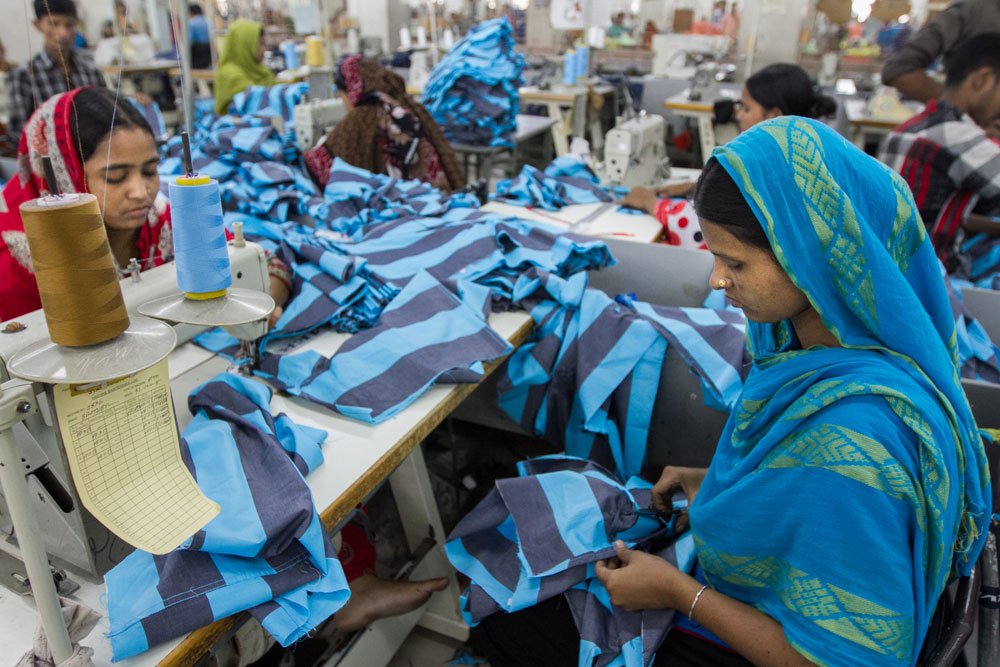
Our RMG sector needs to evolve in order to keep up
Bangladesh’s garments workers, many of whom are now highly skilled at their job, have been demanding an increase in their pay. Workers of numerous readymade garment (RMG) factories in Dhaka, Savar, Ashulia, and Gazipur have been abstaining from work in the past few days, demonstrated by blockading roads and clashing with police, despite government assurance of their demands regarding the pay structure being met.
Bangladesh Garment Manufacturers and Exporters Association (BGMEA), on the other hand, said that the implementation of the new wage structure for apparel workers may lead to the closure of a number of RMG units. For the new pay structure to work, an increase in product prices has to also go with higher wages. If the foreign investors don’t pay up, the domestic economic sector of readymade garments will face a sorry fate.
For a long period, the RMG sector has benefitted because of the low wages of the unskilled labour readily available in Bangladesh. Foreign investors were so willing to invest in Bangladesh because of the low cost of labour, not the business climate, which has continued to be poor. The global hook for Bangladeshi garments has consistently been the lure of cheap labour.
In fact, it has been reported that RMG wages are the lowest in Bangladesh amongst Asian countries. China, perhaps most significantly, has started shifting from this industry for the increased labour costs and the threat of lagging behind the competition. Rather, it has the interest to move towards the high-tech industries.
Bangladesh, therefore, has the opportunity to take the lead in the RMG industry, which brings about the questions — for how many days will Bangladesh be able to enjoy this position and in which way?
RMG industrialists in Bangladesh have been enjoying the highest amount of benefits from the government — tax discounts, preferences in getting industrial electric connections, and direct incentives to set up the company and import raw materials — for more than two decades.
However, this is not an infant industry anymore.
The government is still providing these benefits since Bangladesh has a comparative advantage in the international RMG industry in terms of cheap labour.
Nonetheless, the government cannot provide these benefits to this particular industry perpetually.
Therefore, it is so obvious that business owners will not be able to enjoy these cheap labour benefits for much longer. Now that the unskilled labour has become skilled at their jobs, the wage increase has become a legitimate demand that the government and the owners can no longer overlook, especially with the cost of living increasing day by day.
Even though there is still scope for some increase in the wages without causing a mass migration of RMG companies from Bangladesh to elsewhere, our economy must be prepared for the shock that may befall us in case that happens at some point down the line. The policy-makers and businessmen can solve this complication in two ways — through diversification in export industry and advancing in the value chain of the RMG industry.
Though Bangladesh has invested quite a lot of years in this industry, it has not progressed much in the value chain. Until now, the industry in Bangladesh is involved mostly in the stages of fabric cutting and sewing which are heavily dependent on low and medium-skilled labour.
As the market is becoming competitive, business owners should now concentrate on how to get involved in the stages of designing, pattern-making, and grading to earn more revenue. Other infant, but potential, industries should also be prioritized as well.
However, domestic investment in our country continues to be sluggish. Our economy lacks the structural strength necessary to bear the shock of a sudden pull-out of the big name RMG brands. We need more domestic brands that can sell their own Bangladeshi-made products. For these to take place, our business climate needs to drastically improve.
Anupam Debashis Roy is the Editor-at-large of Muktiforum. He can be reached at muktiforum@gmail.com. Nahian Bin Khaled is a Research Assistant (RA) at International Food Policy Research Institute (IFPRI).


